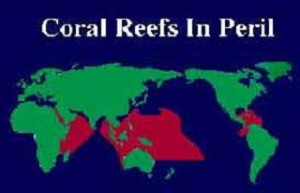Coral Depletion and Regeneration: Villains and Heroes of the Fragile Ocean Ecosystems

Today, in so far as that there was a wonderful article on Boracay Island, one of the most popular tourist destinations in the Philippines. Its four kilometer stretch of white sandy beach is reputed to be among the most beautiful in the entire South Pacific. As a result of this popularity, however the population has ballooned from 3,000 to 30,000 in the last two decades, and the annual influx of tourists is now well over 1.5 million.
Predictably, the beaches are being eroded by waves crashing and carrying the sand out to sea. What could be the cause of such an increase in wave activity? Actually, there are several, one of which is the dying off of coral that formerly surrounded the island. As the coral disappear, there is a huge reduction in the forces that serve to break the power of incoming waves, and so they hit the beach with increasing ferocity.
The cause of the loss of coral is multi-dimensional. The primary culprit is the effluents (soap, dirt, spilled sewage) from all those people living on or visiting the island. The harm is further exacerbated by various elements of climate change and ocean acidification.
The good news is that there is a team of young locals that have constructed massive metal support structures to encourage the growth of new coral. It seems that, even in the face of horrific environmental devastation, people of decency and kindness always come forward with powerful and innovative ways to fight back.

Human construction may be actually doing more harm than benefit.
Studies have shown that coral, especially coral island can eventually evolve to cope with rising water levels. Islands that were once thought to be lost to rising tides, are actually proving very resilient and capable of growing in response.
The island that haven’t coped, are those with man-made sea walls and heavy buildings.
It will be interesting to see the outcome of Boracay Island
I came across an article ” Nonlinearities in patterns of long-term ocean warming”
By authors Maria AA Rugenstein , Jan Sadlacek and Reto Knutti .
The article is a lengthy scolarly work which raises many interesting issue in relation to the oceans ecology.
The following is an extract:
The ocean dominates the planetary heat budget and takes thousands of years to equilibrate to perturbed surface conditions, yet those long time scales are poorly understood. Here we analyze the ocean response over a range of forcing levels and time scales in a climate model of intermediate complexity and in the CMIP5 model suite. We show that on century to millennia time scales the response time scales, regions of anomalous ocean heat storage, and global thermal expansion depend nonlinearly on the forcing level and surface warming. As a consequence, it is problematic to deduce long-term from short-term heat uptake or scale the heat uptake patterns between scenarios. These results also question simple methods to estimate long-term sea level rise from surface temperatures, and the use of deep sea proxies to represent surface temperature changes in past climate.
The full study can be downloaded from the AGU website.
The vast majority of oceanographers/marine biologists are scared to death of the effect that global warming and greenhouse gas emissions are having on the oceans.